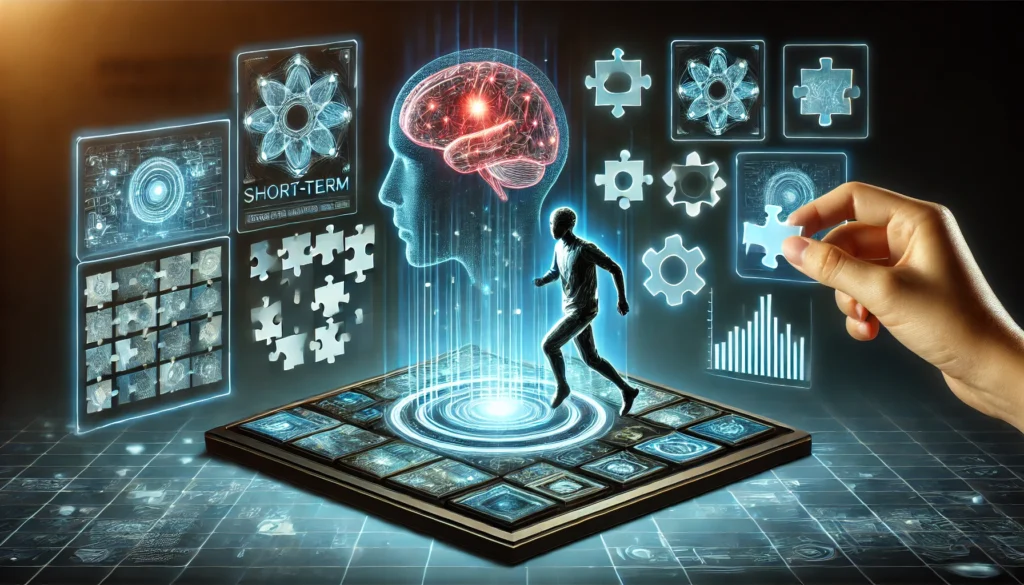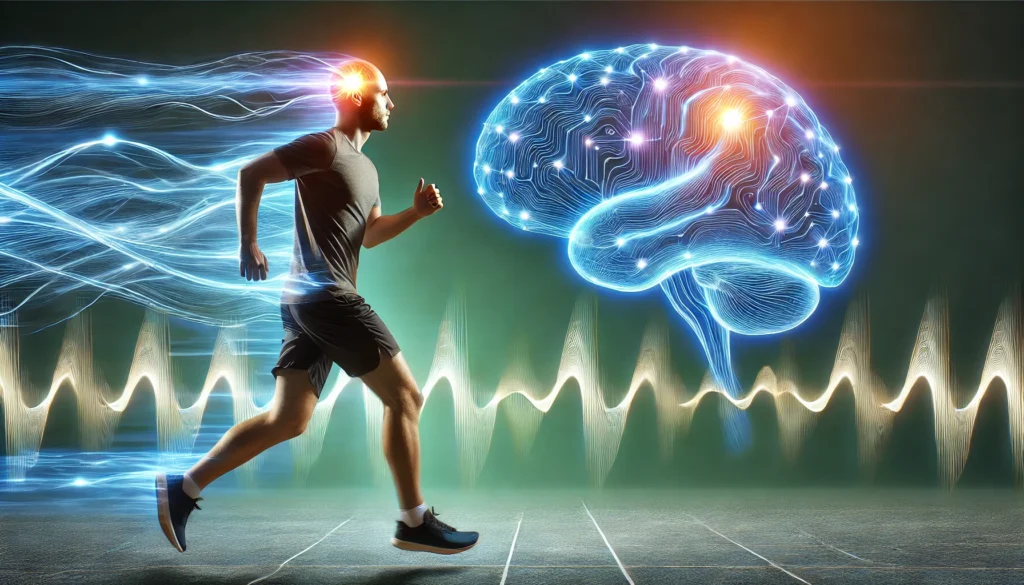Memory, a fundamental aspect of human cognition, governs our capacity to retain and retrieve information. Short-term memory, in particular, plays a crucial role in our daily lives, from recalling a phone number to following directions. Yet, many individuals experience challenges with short-term memory, often wondering, “Can memory loss be reversed?” The answer lies within a spectrum of innovative techniques that can significantly bolster short-term memory.
You may also like: Top 10 Short-Term Memory Boosters
Understanding Short-Term Memory
Before delving into techniques for enhancement, it’s vital to comprehend short-term memory’s mechanics. Short-term memory, also known as working memory, is the cognitive system responsible for temporarily holding information available for processing. This memory type is critical for tasks such as learning, comprehension, and reasoning.
Characteristics of Short-Term Memory
Short-term memory is characterized by its limited capacity and duration. It typically holds around 7 items, such as digits or words, for approximately 20 to 30 seconds. This transient nature means that without active rehearsal or encoding, information may quickly fade. Understanding these characteristics can help individuals develop strategies to enhance memory retention.
The Role of Attention and Focus
Attention and focus are integral to short-term memory. The more attention we pay to information, the better we can encode it into our memory systems. Distractions can hinder this process, leading to memory lapses. Techniques that enhance concentration and focus can therefore improve short-term memory retention.
Encoding and Retrieval Processes
Encoding refers to how information is transformed into a format that can be stored in memory, while retrieval involves accessing that information later. Efficient encoding and retrieval processes are essential for effective short-term memory function. Strategies that enhance these processes can aid in improving memory performance.
The Science Behind Memory Loss
Memory loss, particularly short-term memory loss, can result from various factors including stress, aging, and neurological conditions. The question, “How do you prevent memory loss?” becomes pertinent, especially as we age. Scientific research indicates that while some degree of memory decline is natural, interventions can mitigate its impact.
Impact of Stress on Memory
Stress can significantly impair memory function. When stressed, the body releases hormones like cortisol, which can affect the brain’s ability to encode and retrieve information. Chronic stress can lead to more persistent memory issues, emphasizing the need for stress management techniques.
Prolonged exposure to stress hormones may accelerate cognitive decline, making it crucial to adopt stress-reduction strategies early. Understanding how chronic stress alters brain function can help in developing effective interventions to preserve memory.
Aging and Cognitive Decline
As individuals age, natural cognitive decline can affect memory. This includes changes in brain structure and function that impact memory systems. However, research suggests that mental exercises and lifestyle changes can slow this decline, preserving short-term memory capabilities.
It is important to differentiate normal aging from early signs of dementia, as the two exhibit distinct cognitive patterns. Understanding these differences can guide individuals in seeking timely interventions and support.

Neurological Conditions and Memory
Certain neurological conditions, such as Alzheimer’s and dementia, directly impact memory. While these conditions are more challenging to address, early intervention and targeted therapies can help manage symptoms and improve quality of life.
Cognitive impairment occurs in various stages, from mild deficits to more advanced conditions affecting daily life. Gaining insight into these different levels can help individuals and caregivers make informed decisions about treatment and support.
Techniques to Boost Short-Term Memory
Cognitive Exercises
Cognitive exercises are a cornerstone of memory enhancement. Activities such as puzzles, crosswords, and memory games challenge the brain, fostering neural plasticity. These exercises are not only engaging but also serve as a practical solution to the query, “How to help short-term memory?”
Practicing targeted memory techniques can significantly enhance cognitive flexibility and recall speed. Exploring scientifically-backed methods for memory improvement can further strengthen short-term memory and cognitive resilience.
Types of Cognitive Exercises
There are various types of cognitive exercises that target different aspects of memory and cognition. These include visual memory games, logic puzzles, and language-based challenges. Each type offers unique benefits and can be tailored to individual preferences and needs.
Benefits of Regular Practice
Consistent engagement in cognitive exercises leads to improved memory function over time. Regular practice strengthens neural connections, enhancing the brain’s capacity to store and retrieve information. This can be particularly beneficial for individuals experiencing mild memory decline.
Integrating Exercises into Daily Life
Incorporating cognitive exercises into daily routines can be simple and enjoyable. Setting aside time each day for brain-challenging activities can make a significant difference in memory performance. This approach ensures that memory enhancement becomes a sustainable part of everyday life.
Mindfulness and Meditation
Mindfulness and meditation are potent tools for memory improvement. Studies have shown that these practices enhance cognitive function by reducing stress and promoting relaxation. For those wondering how to help someone with memory problems, introducing mindfulness can be a valuable step.
Techniques for Mindfulness Meditation
Mindfulness meditation involves focusing on the present moment without judgment. Techniques include deep breathing, body scans, and mindful walking. These practices help calm the mind, making it easier to focus and remember information.
Impact of Meditation on Brain Structure
Research indicates that regular meditation can lead to structural changes in the brain, particularly in areas related to attention and memory. These changes can enhance cognitive processes, making memory retrieval more efficient.
Practical Ways to Start Meditating
Starting a meditation practice doesn’t require significant time or resources. Simple activities like focusing on the breath for a few minutes each day can have profound effects. Online resources and apps can also provide guided meditations for beginners.

Nutrition and Brain Health
Diet plays a pivotal role in brain function. Consuming foods rich in antioxidants, omega-3 fatty acids, and vitamins can help restore memory and prevent cognitive decline. Leafy greens, fatty fish, and berries are among the best choices for those seeking to boost short-term memory through nutrition.
Optimal nutrition not only supports cognitive function but also enhances neural connectivity and learning capacity. Delving into the intricate relationship between diet and the mind can provide valuable insights into brain health.
Essential Nutrients for Memory
Certain nutrients are particularly beneficial for memory health. These include vitamins like B12 and D, minerals like magnesium, and healthy fats. Each plays a role in supporting brain function and protecting against memory loss.
Foods that Support Cognitive Function
Incorporating brain-boosting foods into the diet can enhance memory. Examples include walnuts, known for their omega-3 content, and blueberries, rich in antioxidants. Regular consumption of these foods can improve short-term memory and overall cognitive health.
The Role of Hydration
Hydration is often overlooked but is crucial for cognitive function. Dehydration can lead to confusion and memory problems. Ensuring adequate fluid intake supports brain performance and can help maintain sharp memory.
Physical Exercise
Physical activity is not only beneficial for the body but also for the brain. Regular exercise increases blood flow to the brain, supporting memory and cognitive function.
Exercise has been linked to improved reaction times and enhanced brain processing speed, counteracting cognitive decline. Debunking common misconceptions about brain processing can help individuals adopt more effective strategies for maintaining cognitive sharpness.
Exercise and Neurogenesis
Exercise promotes neurogenesis, the creation of new neurons, in the hippocampus, a brain area critical for memory. This process enhances the brain’s ability to process and retain information, contributing to improved short-term memory.
Types of Exercises for Brain Health
Various forms of exercise, from aerobic activities like running to strength training and yoga, benefit brain health. Each type offers unique advantages and can be adapted to personal preferences and fitness levels.

Creating an Exercise Routine
Establishing a consistent exercise routine can maximize benefits for memory. Setting achievable goals and gradually increasing intensity ensures that physical activity becomes a regular and enjoyable part of life. This consistency is key to long-term memory enhancement.
Emerging Therapies and Innovations
Nootropics and Supplements
Nootropics, often referred to as “smart drugs,” are substances that may improve cognitive function. They are gaining popularity among biohackers and health enthusiasts. While the efficacy of nootropics varies, supplements like ginkgo biloba and bacopa monnieri show promise in enhancing memory.
Certain pharmaceutical interventions are also used to support cognitive function in cases of dementia and memory decline. Exploring the latest medications and their effects can provide deeper insights into how pharmacological and natural treatments compare.
Popular Nootropics and Their Effects
Various nootropics are available, each with distinct effects on cognition and memory. Some enhance focus and alertness, while others support long-term memory and brain health. Understanding these differences can help individuals choose appropriate supplements.
Safety and Efficacy of Nootropics
While many nootropics are considered safe, it’s essential to research and consult healthcare professionals before use. The efficacy of these substances can vary based on individual health needs and conditions.
Integrating Nootropics into a Healthy Lifestyle
Nootropics can complement other memory enhancement strategies when used responsibly. Integrating them with diet, exercise, and cognitive activities can create a comprehensive approach to improving memory function.
Neurofeedback Therapy
Neurofeedback therapy is an emerging technique that uses real-time brainwave monitoring to improve cognitive function. This therapy could be a game-changer for those wondering how to reverse memory loss in the elderly or due to stress, by training the brain to optimize its performance.
Emerging research is exploring advanced methods for reversing cognitive decline, including cutting-edge neurofeedback applications. These innovations may hold promise in mitigating early signs of dementia and enhancing memory retention.
Understanding Neurofeedback
Neurofeedback involves monitoring brain activity and providing feedback to help individuals regulate their brainwaves. This process can enhance cognitive functions, including memory, by promoting optimal brain states.

Applications and Benefits of Neurofeedback
Neurofeedback has applications in treating various cognitive and psychological issues. It can improve attention, reduce anxiety, and enhance memory performance. These benefits make it an attractive option for those seeking non-invasive memory support.
Getting Started with Neurofeedback
Starting neurofeedback therapy typically involves sessions with a trained practitioner. Understanding the process and setting realistic goals can help individuals maximize the benefits of this innovative approach to memory enhancement.
Strategies for Daily Memory Enhancement
Structured Routines
Establishing structured routines can help mitigate memory challenges. Consistent schedules for eating, sleeping, and working can reduce cognitive load, freeing up mental resources for other tasks. This approach is particularly beneficial for those lamenting, “My short-term memory is terrible.”
Sudden memory lapses can be alarming and may indicate underlying neurological or cognitive issues. Understanding the potential causes of abrupt memory disruptions can help individuals take proactive measures.
Benefits of Routine for Memory
Structured routines provide predictability, reducing the cognitive effort required to remember daily tasks. This can enhance memory by freeing up mental resources for more complex cognitive processes.
Creating Effective Routines
Developing effective routines involves assessing daily activities and identifying areas for consistency. This might include regular meal times, designated work periods, and consistent sleep schedules.
Adapting Routines to Changing Needs
Routines should be flexible enough to accommodate life changes while maintaining consistency. Adapting routines as needed ensures they remain effective in supporting memory and cognitive function.
Use of Memory Aids
Memory aids such as lists, alarms, and calendars can support individuals with memory difficulties. These tools serve as external supports, allowing for better organization and recall of information.
Types of Memory Aids
There are various memory aids available, from digital tools like apps and calendars to physical aids like sticky notes and planners. Each type offers unique benefits and can be tailored to individual preferences.
Implementing Memory Aids Effectively
To maximize the benefits of memory aids, individuals should choose tools that fit their lifestyle and needs. Regular use and consistent application of these aids can significantly enhance memory performance.
Benefits of External Memory Supports
External memory supports reduce the cognitive load, allowing individuals to focus on more complex tasks. This can improve overall cognitive efficiency and memory function, making daily activities more manageable.
Memory tests can help determine the extent of cognitive decline and identify specific areas of impairment. Learning how these assessments work can assist individuals in selecting the most effective memory aids.
Historical Context and Future Implications
Memory Practices Through the Ages
Historically, cultures have employed various techniques to enhance memory, from the Roman method of loci to mnemonic devices. Understanding these practices offers insight into how to help people with short-term memory loss today.
Psychological factors play a crucial role in memory retention, influencing how individuals encode and recall information. Examining the underlying psychological mechanisms of memory loss can offer deeper perspectives on cognitive function.
Ancient Memory Techniques
Ancient civilizations developed sophisticated memory techniques to aid in information retention. The method of loci, for example, used spatial memory to enhance recall. Exploring these methods provides timeless strategies for memory enhancement.
Evolution of Memory Improvement Strategies
Over time, memory improvement strategies have evolved, incorporating scientific insights and technological advancements. This evolution reflects a growing understanding of cognitive processes and memory function.
Cultural Perspectives on Memory
Different cultures have unique approaches to memory enhancement, influenced by social, educational, and philosophical perspectives. Understanding these cultural differences can enrich modern memory practices and strategies.
Future Directions in Memory Research
The future of memory enhancement is promising, with advancements in neuroscience paving the way for innovative therapies. Research into neuroplasticity and brain stimulation continues to evolve, offering hope for reversing memory loss and improving cognitive health.
Various factors, including sleep, nutrition, and cognitive engagement, significantly impact long-term memory retention. A deeper exploration of these influences can lead to more effective strategies for preserving memory across different life stages.
Advances in Neuroplasticity Research
Neuroplasticity research explores the brain’s ability to reorganize itself, offering potential for memory improvement. New findings may lead to targeted therapies that enhance cognitive function through plasticity.
Brain Stimulation Techniques
Emerging brain stimulation techniques, such as transcranial magnetic stimulation (TMS), show promise in enhancing memory. These non-invasive methods could revolutionize memory enhancement by directly influencing brain activity.
Implications for Cognitive Health
Ongoing memory research has profound implications for cognitive health, potentially leading to new treatments for memory-related conditions. As understanding deepens, individuals may benefit from increasingly effective memory support strategies.

Conclusion
In conclusion, while short-term memory challenges are common, they are not insurmountable. With a combination of cognitive exercises, mindfulness, nutrition, and emerging therapies, individuals can effectively boost their short-term memory. By integrating these techniques into daily life, it’s possible to not only restore memory but also enhance overall cognitive function. As we continue to explore the intricacies of the brain, the potential for memory improvement remains vast, offering new possibilities for those seeking to optimize their mental acuity.
Further Reading:
An effortless way to improve your memory
Science-Backed Memory Tips and Recall Techniques
Important Note: The information contained in this article is for general informational purposes only, and should not be construed as health or medical advice, nor is it intended to diagnose, prevent, treat, or cure any disease or health condition. Before embarking on any diet, fitness regimen, or program of nutritional supplementation, it is advisable to consult your healthcare professional in order to determine its safety and probable efficacy in terms of your individual state of health.
Regarding Nutritional Supplements Or Other Non-Prescription Health Products: If any nutritional supplements or other non-prescription health products are mentioned in the foregoing article, any claims or statements made about them have not been evaluated by the U.S. Food and Drug Administration, and such nutritional supplements or other health products are not intended to diagnose, treat, cure, or prevent any disease.


